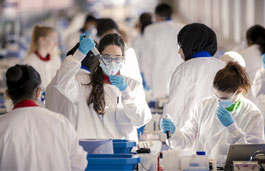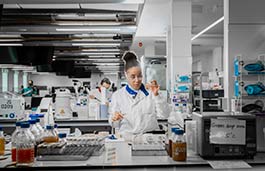Search
Biological and Forensic Sciences BSc (Hons)
Study level: Undergraduate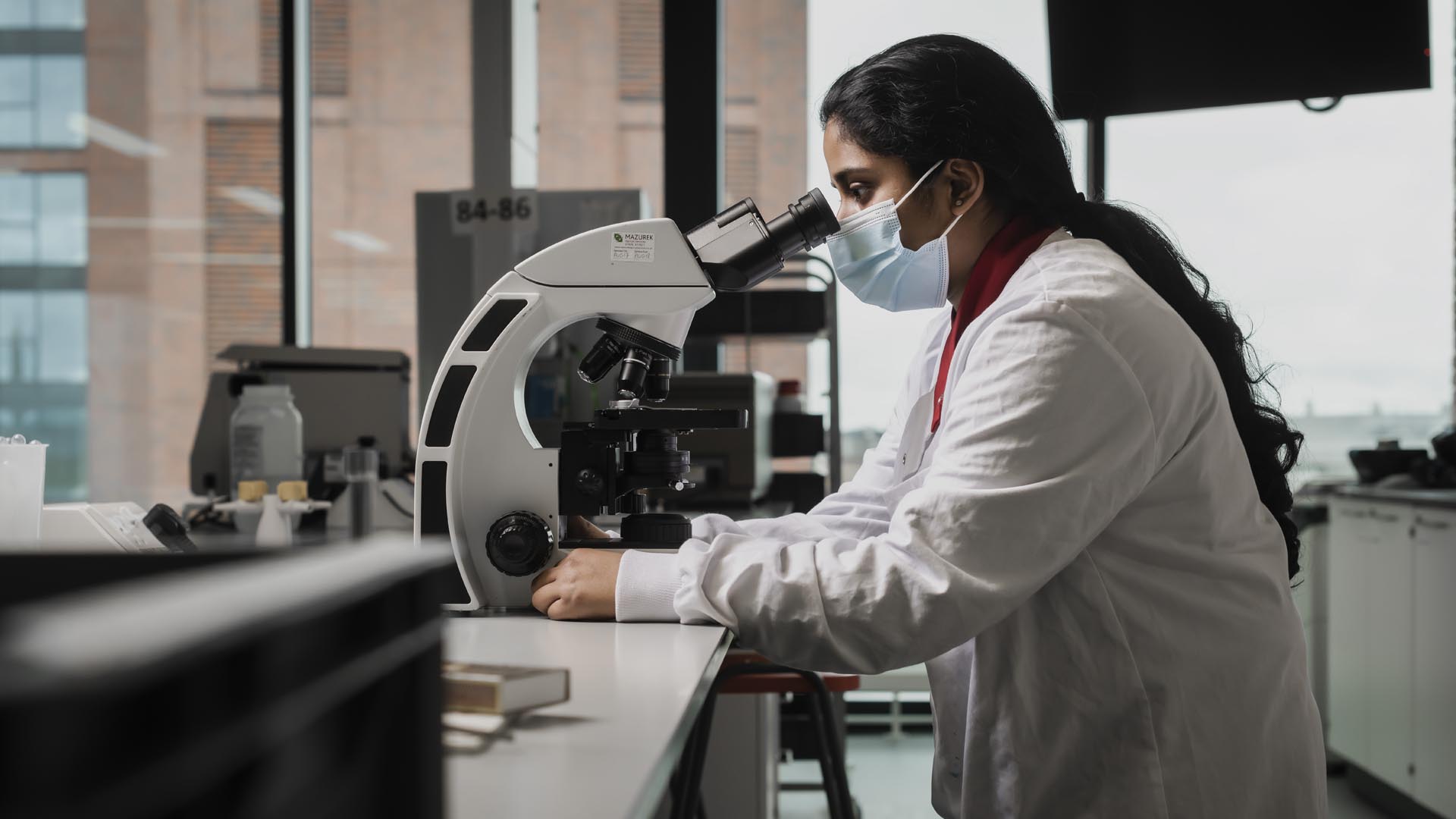
This course combines the study of the rich diversity of biology and the living world, with the forensic challenge of using scientific analysis to investigate legal cases.
Course features
Year of entry
Location
Coventry University (Coventry)
Study mode
Full-time
Sandwich
Duration
3 years full-time
4 years sandwich
Condensed first year available
Course code
CF94
Start date
January 2026 - condensed
Course overview
You can expect to tackle a wide variety of challenges, ranging from developing new techniques to address the spread of infectious diseases, to using practical problem-solving skills to analyse evidence from crime scenes and bring justice to victims of crime.
The course aims to:
- enable you to apply critical thinking skills to assess and solve problems in biological and forensic sciences, considering different perspectives and ethical approaches
- develop your knowledge and understanding of the cellular and molecular basis of human health and disease, and of forensic science, including the criminal justice system processes and investigative practice
- provide a broad and varied educational experience, with experiential learning including a wide range of community and international contexts, and multidisciplinary real-world problems.
The January start for this course is condensed in Year 1. Please see the ‘How you’ll learn’ section below for more details.
Rated Gold Overall
Teaching Excellence Framework (TEF) 20235 QS Stars for Teaching and Facilities
QS Stars University RatingsTop 5 Student City in England (Coventry)
QS Best Student Cities Index 2026Why you should study this course
- A teaching team of multi-disciplinary experts from various subjects, including biologists, chemists, pharmacologists, toxicologists, forensic scientists, investigators and lawyers who bring their research and practical experiences into their teaching (staff are subject to change).
- Hands-on practical experience in the Superlab+, the immersive crime scene simulation houses, and the outdoor search and decomposition facilities, so that you can walk confidently into a graduate job knowing that you have already used some of the same equipment used in hospital, commercial, police and research laboratories4.
- A 3D printing lab where you can learn to design and 3D-print your own creations4.
- Visits from expert guest lectures from professionals in their field, who provide insight into the numerous employability options available2.
- Opportunities to study international cold cases and take a global approach to your studies with collaborative online projects and the possibility of international field trips2.
If you choose to start this course in January you will study exactly the same course but over a slightly shorter timescale in Year 1. This is ideal if you missed the September start, want to transfer from a different university or course or just need a bit more time to prepare for life at university.
Accreditation and professional recognition
This course is currently accredited1 by the following accrediting body for the 2025/26 intake.
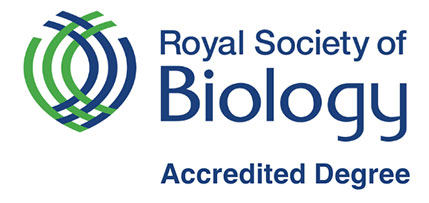
The Royal Society of Biology
This course is accredited by the Royal Society of Biology (RSB) up to and including September 2028 entry for the purpose of meeting in part the academic and experience requirement for the Membership and Chartered Biologist (CBiol).
This programme has been accredited by the Royal Society of Biology following an independent and rigorous assessment. Accredited degree programmes contain a solid academic foundation in biological knowledge and key skills and prepare graduates to address the needs of employers. The accreditation criteria require evidence that graduates from accredited programmes meet defined sets of learning outcomes, including subject knowledge, technical ability and transferable skills.
Our award-winning Green Superlab
With space for over 250 students and packed full of industry-standard equipment, the Coventry University Superlab is an amazing place to learn, experiment and discover. Find out what we’re doing in our Superlab to make it greener and reduce our waste and carbon emissions.
What you'll study
We regularly review our course content, to make it relevant and current for the benefit of our students. For these reasons, course modules may be updated.
How you'll learn
The teaching and learning strategy integrates underpinning theoretical principles with the development of practical and professional competencies. The teaching and learning approaches include:
- keynote lectures
- group interactive workshops
- seminars
- laboratory and forensic crime-scene simulation sessions4
- directed and self-directed group-based and individual study.
If you choose to start this course in January it will be run as a condensed programme. You’ll start your course in January and finish your first year in August. Upon successful completion of Year 1, you will progress onto Year 2 in September and then continue to start subsequent years of your course in September, completing your degree at the same time as the September starters unless you opt to do a placement year.
Teaching contact hours
As a full-time undergraduate student, you will study modules totalling 120 credits each academic year. A typical 20 credit module requires a total of 200 hours study. This is made up of teaching contact hours, guided and independent study.
Teaching hours:
Teaching hours vary each semester, year of study and due to module selection. During your first year you can expect 15-18 teaching hours each week. You will also have the option to attend optional sessions including time with a progress coach or to meet with staff for advice and feedback. As you progress through your studies, teaching hours may reduce.
Guided and independent study:
Throughout your studies, you will be expected to spend time in guided and independent study to make up the required study hours per module. You'll be digging deeper into topics, review what you've learnt and complete assignments. This can be completed around your personal commitments. As you progress through your studies, you'll spend more time in independent study.
Online learning:
As an innovative university, we use different teaching methods including online tools and emerging technologies. So, some of your teaching hours and assessments may be delivered online.
Assessment
This course will be assessed using a variety of methods which will vary depending upon the module.
Assessment methods may include:
- tests
- essays
- group work
- presentations
- reports
- projects
- coursework
- individual assignments
- laboratory competency tests
- portfolios
- mock court room oral testimony
- posters
- critical reviews
- reflections
- case study-based approaches with scenarios based on real world issues.
The Coventry University Group assessment strategy ensures that our courses are fairly assessed and allows us to monitor student progression towards achieving the intended learning outcomes.
International experience opportunities
Previous students in our department have been successful in securing places to study in Spain, France, Canada and the US.
The course typically attracts many international students, providing a diverse learning experience. This can enhance the discussion of issues such as genetic inheritance, criminal justice and biomedical interventions and provides all students with a global perspective of developments in both human biology and forensic science.
Please note that all international experience opportunities may be subject to additional costs, competitive application, availability, and meeting applicable visa and travel requirements are therefore not guaranteed2.
Entry requirements
Typical entry requirements:
Fees and funding
| Student | Full-time | Part-time |
|---|---|---|
| UK, Ireland*, Channel Islands or Isle of Man | £9,535 per year | Not available |
| EU | £9,535 per year with EU Support Bursary** £18,300 per year without EU Support Bursary** |
Not available |
| International | £18,300 per year | Not available |
If you choose to study this course with a professional placement2 or study abroad year, you will need to pay a tuition fee3 to cover your academic support throughout your placement year. Students commencing their professional placement in the academic year 2027/28 will pay £1,500 if they are paying UK fees, or £1,800 if they are paying international fees.
For advice and guidance on tuition fees and student loans visit our Undergraduate Finance page and see The University’s Tuition Fee and Refund Terms and Conditions.
The University will charge the tuition fees that are stated in the above table for the first Academic Year of study. The University will review tuition fees each year. For UK (home) students, if Parliament permits an increase in tuition fees, the university may increase fees for each subsequent year of study in line with any such changes. Note that any increase is expected to be in line with inflation.
If you choose to study this course with a professional placement, the University will charge the tuition fees stated above for those on a placement during Academic Year 2027/28. The University will review professional placement tuition fees each year. For UK (home) students, the University may increase fees for each subsequent year of study, but such that it will be no more than 5% above inflation.
For international students, we may increase fees each year, but such increases will be no more than 5% above inflation. If you defer your course start date or have to extend your studies beyond the normal duration of the course (e.g. to repeat a year or resit examinations) the University reserves the right to charge you fees at a higher rate and/or in accordance with any legislative changes during the additional period of study.
We offer a range of International scholarships to students all over the world. For more information, visit our International Scholarships page.
Tuition fees cover the cost of your teaching, assessments, facilities and support services. There may be additional costs not covered by this fee such as accommodation and living costs, recommended reading books, stationery, printing and re-assessments should you need them. Find out what's included in your tuition costs.
The following are additional costs not included in the tuition fees:
- Any optional overseas field trips or visits: £400+ per trip.
- Any costs associated with securing, attending or completing a placement (whether in the UK or abroad).
Condensed course – January start date
If you choose to start this course in January please make sure you check the Fees and Finance page for more information. Although starting this course in January does not prohibit you from being eligible for student finance, the way it is paid in your first year differs from those who start their course in September.
If you start the course in January, your tuition fees will be paid in accordance with the university’s Tuition Fees, Refund and Withdrawal Terms and Conditions for January starters and for any further years of study, your fees will be paid in accordance with the terms for September starters.
*Irish student fees
The rights of Irish residents to study in the UK are preserved under the Common Travel Area arrangement. If you are an Irish student and meet the residency criteria, you can study in England, pay the same level of tuition fees as English students and utilise the Tuition Fee Loan.
**EU Support Bursary
Following the UK's exit from the European Union, we are offering financial support to all eligible EU students who wish to study an undergraduate or a postgraduate degree with us full-time. This bursary will be used to offset the cost of your tuition fees to bring them in line with that of UK students. Students studying a degree with a foundation year with us are not eligible for the bursary.
Facilities
This course is taught at the Coventry University main campus and you will benefit from using our SuperLab+ where you can learn to carry out a wide range of experimental techniques using the same equipment found in hospital, commercial, police and research laboratories4.
Take a virtual tour
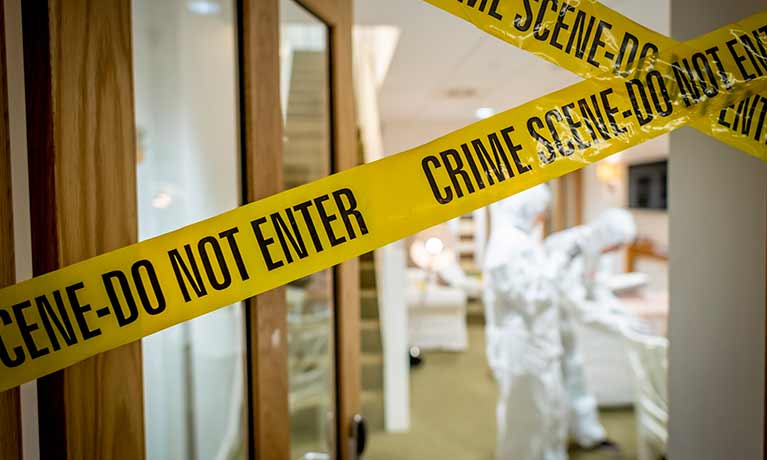
Community houses
Immersive crime scene simulation houses, outdoor search and decomposition facilities.
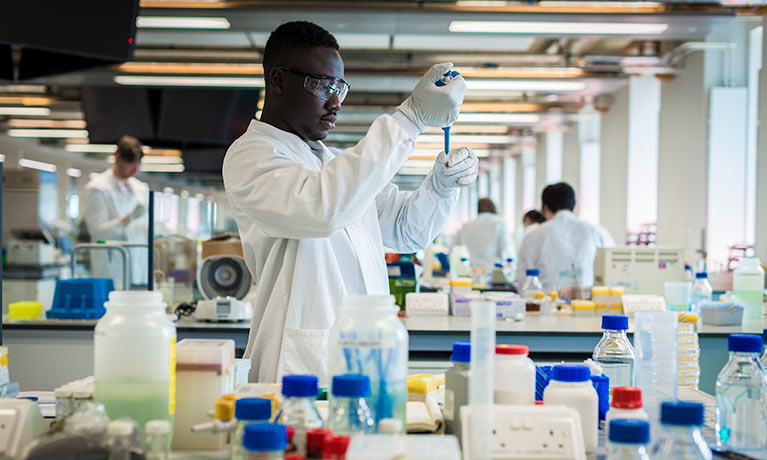
SuperLab
The Alison Gingell building contains a state-of-the-art SuperLab. The lab's facilities include equipment for microscopy, DNA analysis and forensic testing.
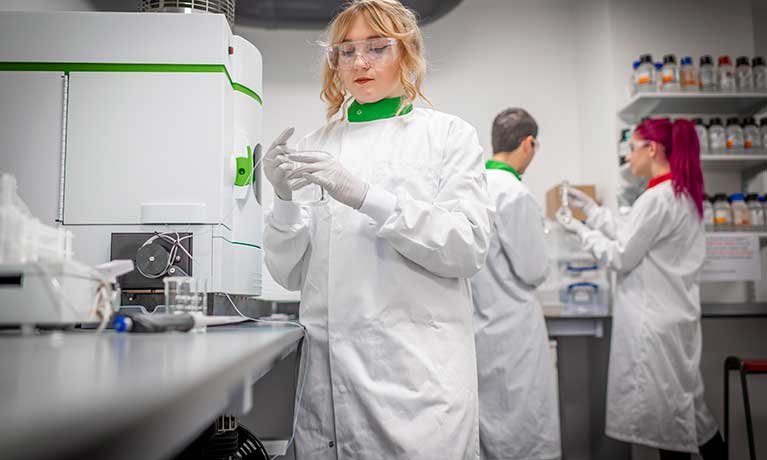
Analytical Chemistry suite
The Analytical Chemistry Suite is a dedicated space for chemistry-based teaching. Students can complete ‘wet’ chemistry and preparatory work, complemented by a comprehensive suite of analytical equipment which includes ICP-OES, uHPLC, HPLC, Fluorescence Spectrometers, UV Spectrometers, GC, and GC-MS.
Facilities are subject to availability. Access to some facilities (including some teaching and learning spaces) may vary from those advertised and/or may have reduced availability or restrictions where the university is following public authority guidance, decisions or orders.
Careers and opportunities
Highly multi-disciplinary in its approach, the course brings together a wide range of key subjects. In biology, the course explores areas like biochemistry, molecular and cell biology, immunology, human physiology, and microbiology. Forensic science topics covered include blood spatter, fingerprints, toxicology, anthropology and taphonomy. This combination of the two subjects is unique in the field and gives our graduates a broad perspective that can be very appealing to employers.
Graduates also gain hands-on experience of DNA profiling, as well as the digital fluency with databases and bioinformatics that underpins both areas of science. Students graduate with the knowledge to tackle challenges such as stopping the spread of disease, improving public health, as well as the practical skills and abilities to analyse, interpret and present evidence. This side specialism in forensic sciences also provides excellent tangible evidence of problem-solving, critical thinking, anti-contamination technique, good record-keeping, teamwork, interpersonal skills and professionalism.
Our graduates are equipped to pursue a wide range of careers. The extensive biology content supports employment in biological research and industry, including pharmaceutical, microbiology or food quality-testing laboratories, as well as medical and scientific equipment sales. The forensic science elements further broaden employment options, to include DNA analyst, DNA reporting officer and forensic scientist jobs. The multi-disciplinary course prepares graduates for a wide range of careers, such as data analysis, scientific writing and teaching roles.
Where our graduates work
Our graduates have gone on to work in places such as Cellmark, Key Forensics, West Midlands Police and Metropolitan Police.

Discover Phoenix+
Phoenix+ brings you together with other students to learn, experience and develop essential knowledge and skills. Whatever destination you choose, it's about preparing you for life after university.
Learn more about Phoenix+How to apply
You may also like
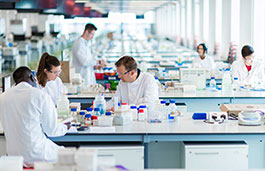
Biomedical Science/Applied Biomedical Science BSc (Hons)
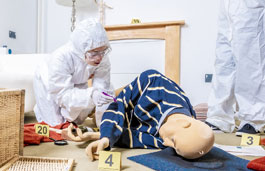
Forensic Science BSc (Hons)
